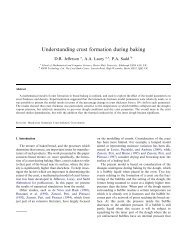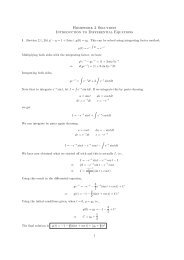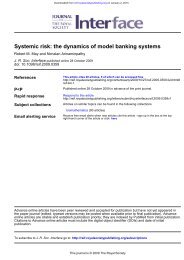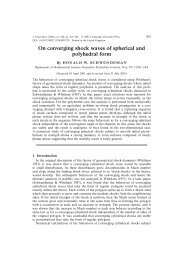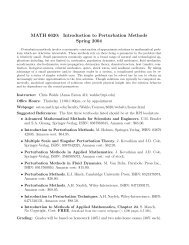ILOG CPLEX C++ API 9.0 Reference Manual
ILOG CPLEX C++ API 9.0 Reference Manual
ILOG CPLEX C++ API 9.0 Reference Manual
Create successful ePaper yourself
Turn your PDF publications into a flip-book with our unique Google optimized e-Paper software.
IloCplex<br />
priorities are given preference over integer variables with lower priorities. Further,<br />
variables that have priority values assigned to them are given preference over variables<br />
that don't. Priorities must be positive integers.<br />
public void setPriority(IloNumVar var,<br />
IloNum pri)<br />
This method sets the priority order for the variable var to pri. During branching,<br />
integer variables with higher priorities are given preference over integer variables with<br />
lower priorities. Further, variables that have priority values assigned to them are given<br />
preference over variables that don't. Priorities must be positive integers.<br />
public void setPWLFormulation(IloCplex::PWLFormulation f)<br />
This method allows you to control the way piecewise linear expressions are represented<br />
when <strong>CPLEX</strong> automatically transforms them during extraction.<br />
public void setVectors(const IloNumArray x,<br />
const IloNumArray dj,<br />
const IloNumVarArray var,<br />
const IloNumArray slack,<br />
const IloNumArray pi,<br />
const IloRangeArray rng)<br />
This method allows a user to specify a starting point for the following invocation of the<br />
solve method. Zero can be passed for any of the parameters. However, if x or dj is<br />
not zero, var must not be zero either. Similarly, if slack or pi is not zero, rng must<br />
not be zero either.<br />
For all variables in var, x[i] specifies the starting value for the variable var[i].<br />
Similarly, dj[i] specifies the starting reduced cost for variable var[i]. For all<br />
ranged constraints specified in rng, slack[i] specifies the starting slack value for<br />
rng[i]. Similarly, pi[i] specifies the starting dual value for rng[i].<br />
This information is exploited at the next call to solve, to construct a starting point for<br />
the algorithm, provided that the AdvInd parameter is set to a value greater than or<br />
equal to one. In particular, if the extracted model is an LP, and the root algorithm is dual<br />
or primal, the information is used to construct a starting basis for the simplex method for<br />
the original model, if AdvInd is set to 1 (one). If AdvInd is set to 2, the information<br />
is used to construct a starting basis for the presolved model.<br />
If the extracted model is a MIP, only x values can be used, and a value must be specified<br />
for all variables of type ILOINT. If the provided values are compatible with an integer<br />
feasible solution, that solution becomes the incumbent for the next search; otherwise,<br />
the starting information is ignored. The parameter IloCplex::MIPStart must be<br />
turned on (that is, set to IloTrue) for the starting point to take effect.<br />
public IloBool solve(IloCplex::Goal goal)<br />
This method initializes the goal stack of the root node with goal before starting the<br />
branch & cut search. The search tree will be defined by the execute method of goal and<br />
<strong>ILOG</strong> <strong>CPLEX</strong> <strong>C++</strong> <strong>API</strong> <strong>9.0</strong> REFERENCE M ANUAL 73


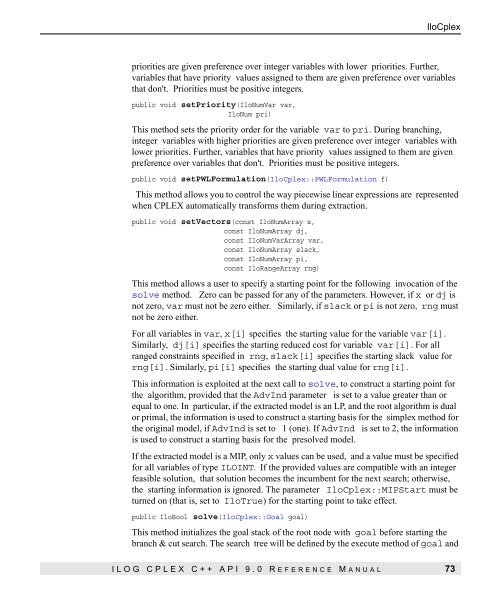
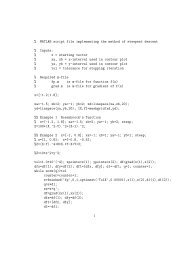

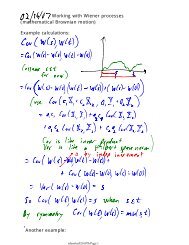

![MATH 1500 Sample Questions Exam 2 1. [3.7] A 10-ft plank is ...](https://img.yumpu.com/43861920/1/190x245/math-1500-sample-questions-exam-2-1-37-a-10-ft-plank-is-.jpg?quality=85)


